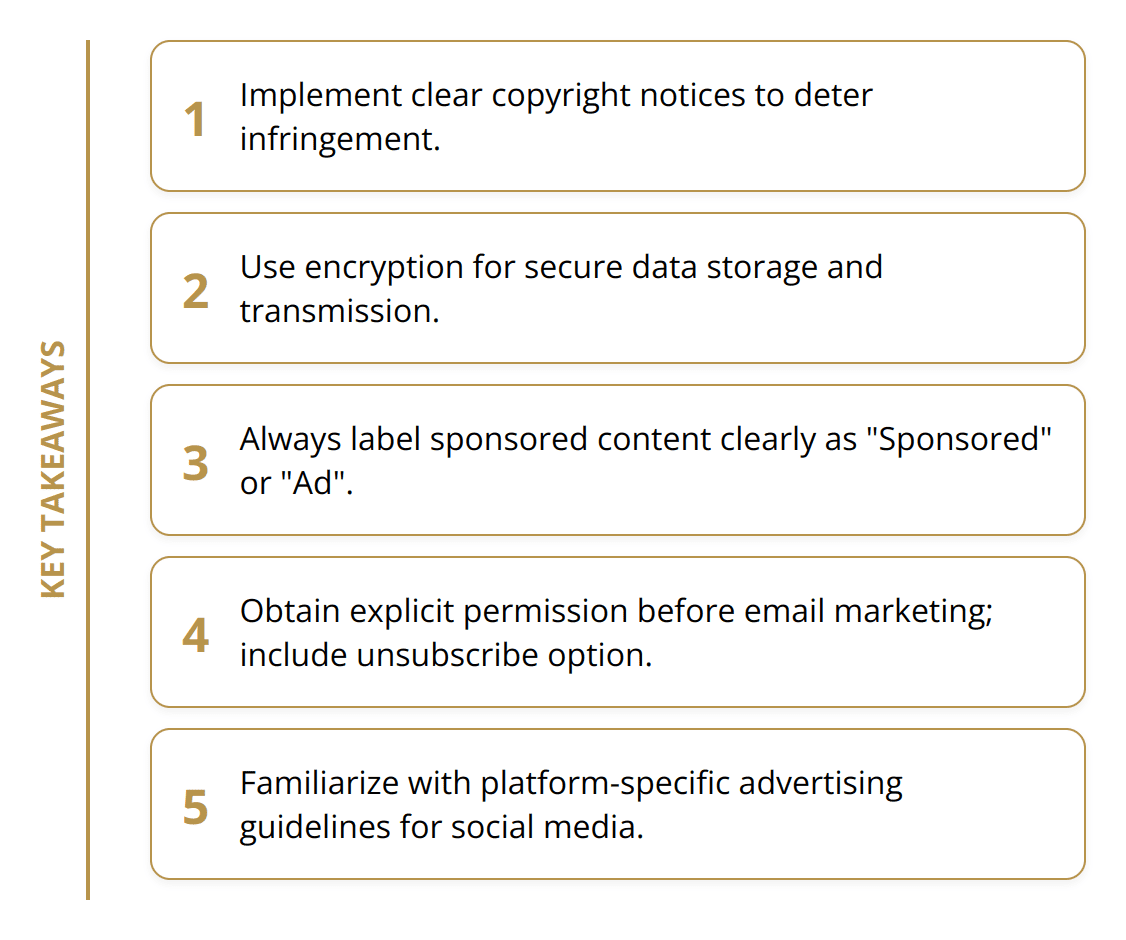Navigating the complex world of online publishing regulations is essential for any content creator or publisher. At Beverly Hills Publishing, we understand the importance of staying updated on the legal landscape to protect your work and respect others’.
This guide will highlight key areas including copyright laws, privacy considerations, and advertising regulations, offering practical advice and insights. It’s designed to help you stay informed and compliant in your publishing endeavors.
Navigating Copyright Laws
Navigating the labyrinth of copyright laws in online publishing is no small feat, yet it’s fundamental for protecting your content and avoiding legal pitfalls. Understanding the basic protections copyright law offers, how it applies to digital content, and the correct way to manage fair use and permissions, can make the difference between thriving and facing legal challenges in the digital space.
The Essence of Copyright Protection
The first step is to understand that copyright law gives content creators legal ownership of their work. This means that original works of authorship, including literary, musical, and certain other intellectual works, are protected the moment they are fixed in a tangible medium of expression. For online content creators, this translates to a wide array of materials such as articles, blog posts, images, and videos. The key is originality; the content must spring from your creativity and not be copied from another source.
Copyright and Online Content
The digital sphere complicates copyright protections due to the ease of sharing and distributing content. Nonetheless, the essence remains unchanged; if you’ve created it, you own it. However, owning content online comes with the duty to defend it. Implementing clear copyright notices and using digital rights management tools can deter infringement. Additionally, familiarizing yourself with the Digital Millennium Copyright Act offers avenues for action if your work is unlawfully reproduced.

Fair Use and Permissions: A Tightrope Walk
The concept of fair use is both a blessing and a curse for content creators. It allows for the use of copyrighted material under certain conditions, such as criticism, comment, news reporting, teaching, and research, without the need for permission from or payment to the copyright holder. However, the line between fair use and copyright infringement is often blurry.
When in doubt, err on the side of caution:
- If using someone else’s content adds value or context to your work, seek permission.
- Credit the original creator whenever you use their work under the fair use exemption.
- Be mindful that fair use is subjective and depends on the nature of the copyrighted work, the amount used, and its impact on the market value of the original work.

In conclusion, navigating copyright laws in online publishing demands a proactive approach. Protect your own work vigorously, respect the copyrights of others, and tread carefully around the grey areas of fair use. By doing so, you can safeguard your online presence and foster a culture of respect and integrity in the digital content community.
Protecting Digital Privacy
In the rapidly evolving digital landscape, protecting your readers’ privacy is not just a legal requirement—it’s a cornerstone of trust and respect in the online publishing arena. The rise of data breaches and stringent regulations such as GDPR have shifted the spotlight onto how personal data is collected, used, and safeguarded. Here’s an action-focused approach to navigating these waters.
Why Data Privacy Matters
Digital privacy isn’t merely about compliance; it’s about valuing your audience. Readers entrust their personal information with the expectation that it will be handled responsibly. Failure to protect this data not only leads to legal repercussions but can significantly damage your reputation. In an era where trust is hard to earn and easy to lose, prioritizing privacy is a formidable competitive advantage.
Implementing Robust Data Policies
Having a transparent data policy is the first step toward respecting reader privacy. This policy should clearly outline:
- The type of data collected (names, email addresses, etc.)
- The purpose of data collection (newsletter subscriptions, personalized content, etc.)
- How the data will be stored and protected
- The readers’ rights regarding their data, including how they can access, modify, or delete their information
Invest in secure databases and regularly audit your data handling practices to prevent breaches. Use encryption for data transmission and storage, and restrict access to personal data within your organization.
GDPR and Global Privacy Regulations
The General Data Protection Regulation (GDPR) has set a new standard for data protection, impacting publishers worldwide. Even if you’re based outside the European Union, if your content reaches EU residents, GDPR compliance is mandatory. Key requirements include obtaining explicit consent for data collection, enabling users to easily withdraw consent, and notifying users of breaches promptly.
Other regions have introduced similar regulations, such as the California Consumer Privacy Act (CCPA) in the United States. Staying informed about these laws and adapting your practices is vital. Ignorance is not a defense, and the penalties for non-compliance can be severe.
Practical Tips for Enhanced Privacy:
- Regularly update your privacy policy to reflect current practices.
- Utilize consent management platforms to streamline GDPR compliance.
- Conduct privacy impact assessments when launching new projects or using new technologies.
- Offer regular privacy training to your team to ensure everyone understands their responsibilities.

Keeping ahead of publishing trends includes being proactive about privacy and data protection. As regulations evolve and public awareness about digital rights grows, your commitment to privacy can set you apart and build lasting relationships with your audience.
Online Ad Regulations
In the digital era, advertising and marketing practices have evolved rapidly, leading to an increase in regulations designed to ensure transparency and fairness. Navigating these regulations is vital for publishers and content creators to maintain credibility and legal compliance.
Transparency in Sponsored Content
Audiences deserve to know when content is sponsored. Transparency builds trust, and the Federal Trade Commission (FTC) mandates explicit disclosures for sponsored content. Failure to comply can not only damage your reputation but also result in hefty fines. Here are actionable tips:
- Always label sponsored posts clearly, using terms like “Sponsored” or “Ad”.
- Disclosures should be prominent and near the beginning of the content.
- Influencers must also disclose any material relationships with brands.
Email Marketing: Consent is Key
With regulations like the CAN-SPAM Act in the U.S. and GDPR in Europe, consent has become a cornerstone of email marketing. These laws ensure that recipients have opted in to receive emails, providing them with a clear path to unsubscribe. For successful and compliant email marketing:
- Always obtain explicit permission before adding someone to your mailing list.
- Include an easy-to-find unsubscribe option in every email.
- Regularly update your mailing lists to remove individuals who have opted out.
A great resource for best practices in email marketing can offer further insights.
Social Media Marketing and Ethics
Social media platforms have become a battleground for attention, with specific rules in place to govern advertising practices. Adhering to these regulations not only ensures legal compliance but also respects the platform’s community standards.
- Familiarize yourself with each platform’s advertising guidelines.
- Clearly disclose relationships with brands when promoting products or services.
- Monitor and moderate user-generated content to comply with advertising standards.
In the digital age, staying informed about advertising and marketing regulations is imperative. By adhering to these guidelines, you can ensure your marketing efforts are both effective and compliant. Furthermore, you signal to your audience that you’re committed to ethical practices. This commitment not only safeguards your business against potential legal issues but also strengthens your brand’s integrity.

Final Thoughts
Navigating the complex terrain of online publishing regulations is a vital component of modern content creation and distribution. We at Beverly Hills Publishing understand the gravity of this responsibility and believe that adherence to these laws not only helps in legal compliance but significantly enhances the trust and respect between publishers and their audience. As we discussed earlier, from copyright laws to digital privacy and advertising regulations, staying on top of these evolving rules is essential for a successful online presence.

The importance of staying informed cannot be overstated. Regulations change, and what’s acceptable practice today may not be tomorrow. Compliance ensures not only the protection of your work but also safeguards the privacy and rights of your audience, building a foundation of trust that is critical in today’s digital landscape.
We encourage all content creators, authors, and publishers to invest time in further learning about these regulations. Understanding the essence of copyright protection, implementing robust data policies, and navigating the intricacies of online ad regulations are foundational steps to ensuring your content is not only compelling but also compliant with the law.
Moreover, in an industry where credibility and authority are paramount, staying compliant is not just about adhering to the law—it’s about demonstrating your commitment to ethical standards and respect for your audience. This adherence not only protects you legally but also enhances your brand’s integrity and reputation in the market.
At Beverly Hills Publishing, we are committed to empowering authors by merging groundbreaking publishing with strategic branding and marketing. This comprehensive approach not only ensures compliance with online publishing regulations but also establishes our authors as leading authorities in their industries. Our dedication to quality, credibility, and global reach equips authors with the tools to elevate their visibility, build strong brand identities, and emerge as industry leaders with commanding media presences.
For anyone looking to enhance their personal and professional brands through innovative publishing strategies, we invite you to learn more about how Beverly Hills Publishing can transform your aspirations into achievements.
Remember, in the world of online publishing, knowledge is power, and compliance is key. Keep learning, stay informed, and above all, respect the bond of trust with your audience by adhering to these essential regulations.















































































































































































































































